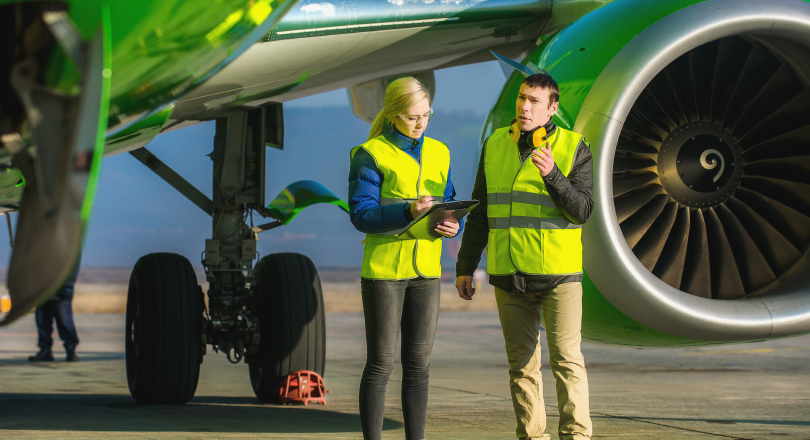Who does Prospect represent in the civil aviation sector?
We represent more than ten different categories of aviation specialists. These include:
- Air traffic control officers and related ATC specialists
- Air traffic systems engineers and specialists
- Civil Aviation Authority inspectors and other regulation professionals
- Licensed aircraft engineers and other airworthiness specialists
- Aircraft technicians, mechanics and fitters.
- Pilots (flight operations inspectors in the CAA and some helicopter pilots in Babcock)
- Airport operations managers
- Airport fire service officers.
How many members do we represent?
We have 5,000 members in aviation, and we’re growing.
What are the top three issues we are facing in civil aviation?
Our current hot issues in aviation are:
Brexit (aviation being the most ‘European’ of all industries) – the future regulation of the industry and especially safety regulation.
Race to the bottom: driven by the rise of the low-cost airline business model, which threatens employment standards and safety.
Resilience: The tension between capacity (airspace and airports) and operational resilience when key skills are in shortage.
Is Prospect doing any specific campaigning in civil aviation right now?
Prospect is currently leading a campaign in alliance with other unions in the ETF and ITF on proposals in the EU to impose restrictions on the rights of air traffic control staff to take industrial action.
We will be consistently lobbying UK government and EU on regulatory issues – particularly safety regulation. We respond to all formal consultations on regulatory matters that fall within the expertise of our members.
We have a rolling programme of policy development on the aviation market covering competition and business models, environmental impact, employment practices, skills and economic and safety regulation.
What does Prospect think are likely to be the big issues in civil aviation over the next five years?
We are also strongly focussed on:
- Technology, including drones and virtual towers.
- Skills (there are major shortages of air traffic controllers, airworthiness engineers, systems and network engineers and pilots).
- Employment practices – the use of non-standard employment contracts (eg Ryanair), the development of two-tier workforces (eg BA) and fatigue management (regulation of working time).
Who are some of the big companies who negotiate with us?
We negotiate on behalf of our members with over thirteen key companies in the industry. They include:
- NATS (air traffic control) – public-private partnership
- ANS (air traffic control) – a subsidiary of German state-owned DFS
- Aquila (air traffic systems)
- HAL (Heathrow Airport)
- GAL (Gatwick Airport)
- AGS (Aberdeen, Glasgow and Southampton Airports)
- MAG (Manchester, Stansted, East Midlands and Bournemouth Airports)
- Highlands and Islands Airports
- BAATL (Birmingham Airport Air Traffic control)
- Flybe
- easyJet
- Babcock MCS Offshore
- Civil Aviation Authority
- Air Accident Investigations Branch (DfT)
Are most of our members permanent employees or freelance/contactors?
Most of our members are permanent employees, however there are a significant number of contractors, especially during the summer months to cope with increased demand.
How do we support our members in civil aviation?
We offer a huge range of support to our aviation members. This includes:
- Collective bargaining
- Bonding
- Casework support and representation – including licensing issues
- TUPE Transfers
- Labour market information
- Individual representation on all work-related issues.
- Pensions
What’s a recent success we’ve had supporting a member, or members, in civil aviation?
The current pay round has seen significant advances in the rates of pay for members – particularly those in shortage occupations.
We recently won a case for a licensed aircraft engineer who was unfairly dismissed by British Airways.
Plus, we have a new recognition deal coming soon. Stay tuned!
Why should you join Prospect if you work in aviation?
Our membership density is very high, particularly among licenced occupations working in safety-critical roles, without which the industry cannot function.
We have unique knowledge of the terms and conditions and working practices (shift working rosters, operational staffing levels, bonding etc) across the industry.
We work closely with employers and the regulators to set the standards that keep the system going and ensure that its impressive safety record is maintained. The best way for aviation professionals to be part of this is to have a voice through Prospect.

